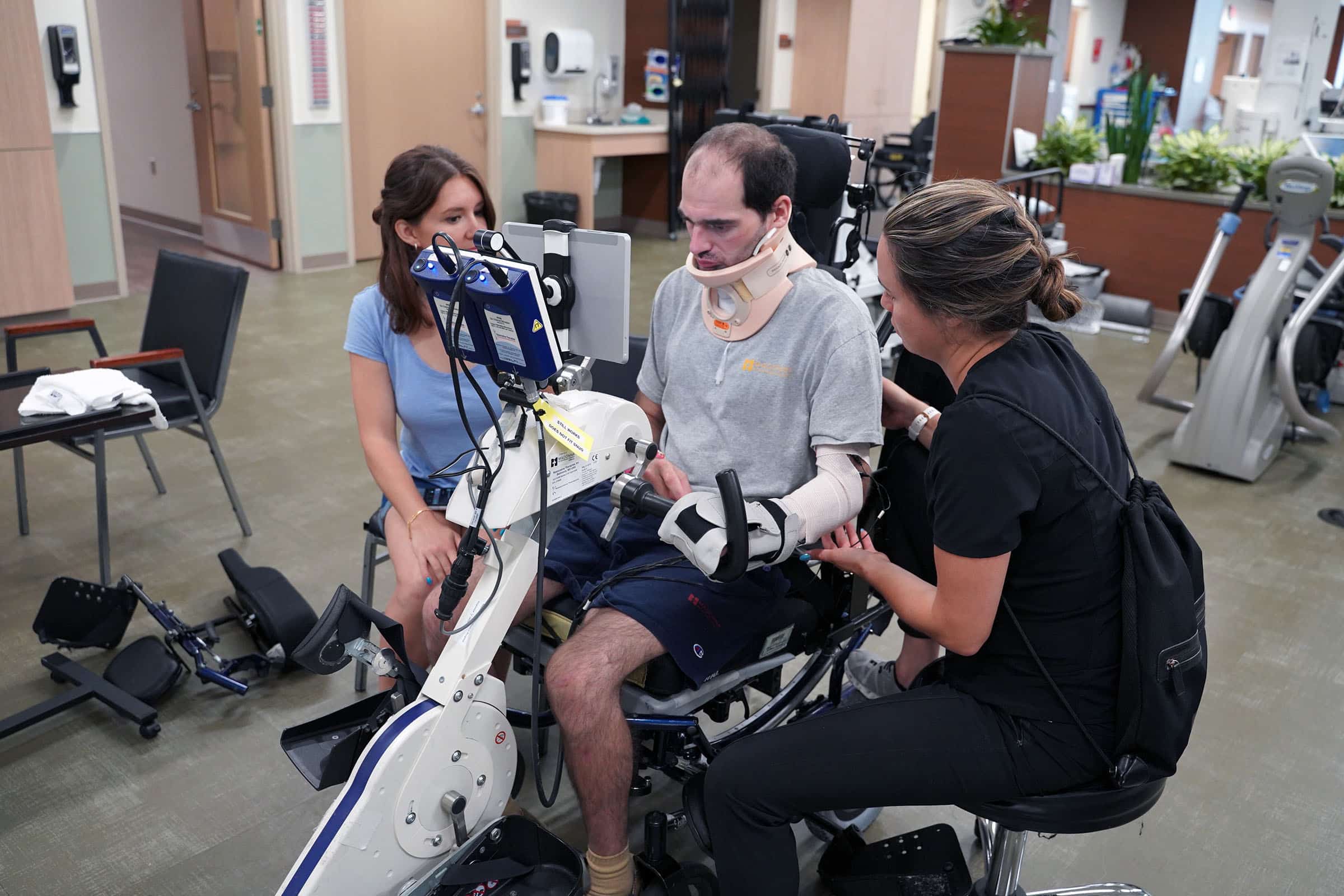For years, 34-year-old Ben Buersken commuted to and from work on his motorcycle. On May 16, a driver pulled out in front of him, causing a serious accident. Ben was wearing a full-face helmet at the time, which saved his life. However, he still sustained several injuries including multiple broken bones and a diffuse axonal brain injury. He needed a ventilator to breathe and was in a coma. After a month in the hospital, he came to Madonna Rehabilitation Hospitals’ specialized disorders of consciousness program to kick-start his recovery journey.
The first goal for Ben’s physician-led care team was to help him emerge from his minimally conscious state.
“When Ben first arrived he had a difficult time participating in a full day of therapy,” Abby McClure, MOT, OTR/L, CBIS, Ben’s occupational therapist, said. “He had a difficult time scanning and tracking with his eyes as well and was unable to hold his head up. He was not talking and had limited awareness.”
Through daily physical, occupational and speech therapies, Ben began to make great gains.
“He very quickly surpassed our coma recovery scale (CRS-R),” McClure said. “The secret to his success was his wife, Sarah. We quickly realized how motivating she was for him as he would often participate better when she was involved.”
A strong support system is crucial to recovery. Research shows incorporating family into a care plan and directly involving them in therapies leads to better outcomes and more carryover of skills learned in therapy sessions. Madonna believes in a holistic approach to care, treating the mind, body and spirit, as well as a patient’s family.
Ben’s wife, Sarah, described the experience as overwhelming, but she was ready to do whatever was needed to help her husband on his recovery journey. She participated in extensive caregiver training and both she and their three children participated in several therapy sessions. The goal was to make sure she felt safe and comfortable caring for Ben while learning ways to decrease the burden of care over time. As he got stronger, Ben was able to do more daily self-cares.
“Madonna does a great job involving family in therapy sessions,” Sarah said. “When our children came to visit, they made sure they had the opportunity to help with dad’s therapy. Loved ones are the most powerful motivators for someone going through rehab. I was able to attend all of Ben’s therapies and help coach and motivate him each day.”
With Sarah by his side, using specialized technology like the Functional Electrical Stimulation (FES) Bike and the LiteGait bodyweight support system, Ben quickly began to show progress. He took steps and began to move the left side of his body on a more consistent basis.
In speech therapy, Ben worked quickly to get his trach capped and eventually removed. He also passed a swallow study, meaning he could begin to incorporate a diet into his daily routine safely. He then began to find his voice.
“He loved saying Sarah’s name and seeing him laugh was a gift!” Mary Haller, MS, CCC-SLP, Ben’s speech-language pathologist, said. “He would always ask for her and was calmer any time she was there. Her devotion to Ben to show up every day no matter what was going on outside the walls of Madonna was truly inspiring to watch. Sarah became Ben’s advocate while continuing to be his wife who loved him through every stage of recovery.”
After eight weeks at Madonna, Ben returned to Ankeny, Iowa to continue his rehabilitation closer to home. When he left, he could eat, walk, talk, read and participate in activities of daily living. Sarah says it feels as though she and her family have lived an entire lifetime since May 16, but she’s proud of how hard her husband worked in therapy and how far he’s come since that day.
“A brain injury is not an easy road to navigate, but we are very thankful for all of the support and exceptional therapy Ben has received,” Sarah said. “It is so hard to watch someone you love go through something like this, but Ben is strong. No two brain injuries are the same. Also through this, I have learned that we have a tremendous amount of love and support from our friends and that God is faithful even when we don’t understand why.”
Looking back on the last six months, Sarah’s advice to families navigating a brain injury journey is to put in the work, no matter how hard it gets. Buying into the entirety of the therapeutic process and taking an active role in your loved one’s care leads to the best outcomes.
“Therapy is life-changing and essential for brain recovery,” Sarah said. “Work with your therapy team to help your loved one. It is not always easy, but it is worth it!”





